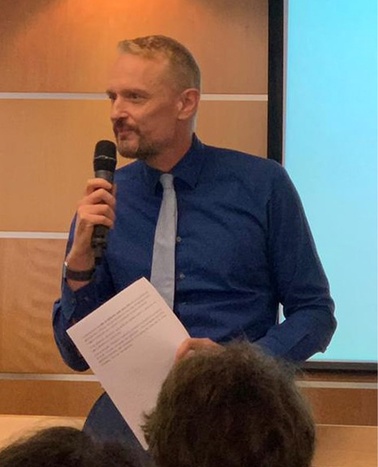
Juergen Foecking
I’m from a village in Northwest Germany, but I’ve spent most of my adult life in Brussels and Madrid. I did my undergraduate degree in economics in Cologne, punctuated by a wonderful Erasmus year in Dublin—which helped spark my continued passion for travel. After completing my PhD thesis in the empirical testing of game-theoretic models, I worked my way through quite a few sectors. I have been active in university settings, banking, management consulting, and currently work for the European Union. This is the beauty of economics; it opens the doors to a vast variety of opportunities and experiences.
"With the emergence of big data, the next generation of economists have the tools to extract insights and even wisdom. This will allows students to interpret new truths and uncover new possibilities. Students will always need to remain critical and ask the right questions, but the future of the financial world is more open than ever."
Juergen Foecking: taking frontline economic insights into a classroom environment
Juergen Foecking’s life represents what is possible when you specialize in economics. On his professional journey, he has made stops in a variety of sectors, providing him with experience from all angles and perspectives. When he was a management consultant, he worked on a daily basis with clients from various international organizations—now, it’s the other way around. As an official in EU institutions, he tenders contracts to consulting firms.
Juergen works for the Representation of the European Institutions in Spain, with offices on Paseo de la Castellana, just opposite the IE campus. On a typical day, he may be involved in activities with Madrid’s citizens that espouse the value of belonging to the EU. Then again, he may be busy representing the European Institutions in conferences, speaking to stakeholders on the Institutions’ behalf, or even dealing with the press.
Although Spain is typically an EU-friendly company, the 2008 financial crisis and the current pandemic can lead to challenging situations. While he welcomes criticism as a constructive aspect of making Europe stronger in the future, he does admit it requires someone with thick skin.
Alongside his work with the EU, Juergen is also an adjunct professor at IE University—an opportunity he jumped at when it presented itself. Ever since his PhD days, he’s been extremely enthusiastic about teaching. He takes classes in the Bachelor in Economics, which he credits with being a very future-forward degree that deals with data science, making students fit for the digital age.

Juergen had to prove that unlawful state aid had been granted, which was difficult to do. They needed access to data and software to analyze passenger numbers, pricing statistics, cost overviews, buying and booking habits of passengers, etc. Nowadays, the world has access to better data and better tools to interpret them, which should improve political decision-making.
These are the types of frontline insights Juergen is able to bring to the classroom on a daily basis, providing students with cutting-edge information on the sector’s developments. In his course on International Trade and Monetary System, he effectively balances these sector insights with more foundational concepts. He guides his students as they lay the groundwork, discovering why trade occurs, how countries design their trade policies, and how exchange rates can be explained and predicted.
Having a broad view of economics at all levels is essential to success. After the 2008 crisis, the reputation of economics took a hit. Despite all the models available, no alarm bells were rung before the crisis hit and people lost faith in the financial sector. However, Juergen now sees an opportunity for economists to redeem themselves—and it is something he encourages his students to do.
Check out in detail Juergen Foecking's academic and corporate experience
